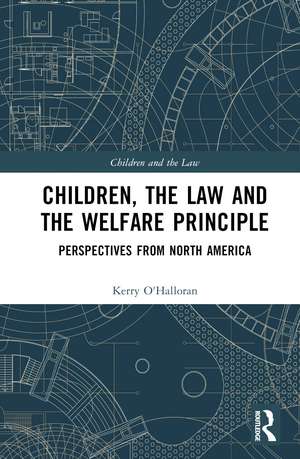Children, the Law and the Welfare Principle: Perspectives from North America: Children and the Law
Autor Kerry O'Halloranen Limba Engleză Hardback – 16 mai 2023
| Toate formatele și edițiile | Preț | Express |
|---|---|---|
| Paperback (2) | 311.28 lei 43-57 zile | |
| Taylor & Francis – 18 dec 2024 | 311.28 lei 43-57 zile | |
| Taylor & Francis – 30 ian 2025 | 389.70 lei 43-57 zile | |
| Hardback (4) | 897.07 lei 43-57 zile | |
| Taylor & Francis – 16 mai 2023 | 897.07 lei 43-57 zile | |
| Taylor & Francis – 6 feb 2024 | 1006.11 lei 43-57 zile | |
| Taylor & Francis – 9 oct 2023 | 1006.43 lei 43-57 zile | |
| Taylor & Francis – 2 apr 2024 | 1009.28 lei 43-57 zile |
Preț: 897.07 lei
Preț vechi: 1093.98 lei
-18% Nou
171.71€ • 186.58$ • 144.33£
Carte tipărită la comandă
Livrare economică 21 aprilie-05 mai
Specificații
ISBN-10: 1032216891
Pagini: 312
Dimensiuni: 156 x 234 x 19 mm
Greutate: 0.62 kg
Ediția:1
Editura: Taylor & Francis
Colecția Routledge
Seria Children and the Law
Locul publicării:Oxford, United Kingdom
Public țintă
GeneralCuprins
Dedication
Acknowledgments
Introduction
Part I
Background
Chap 1 Concepts, Constructs & Cultural Context
Part II
United States of America
Chap 2 Policy, principles, legislation and courts
Chap 3 The welfare principle in contemporary practice: public family law; civil
and criminal jurisdictions
Chap 4 The welfare principle in contemporary practice: private family law and
hybrid proceedings
Part III
Canada
Chap 5 Policy, principles, legislation and courts
Chap 6 The welfare principle in contemporary practice: public family law; civil
and criminal jurisdictions
Chap 7 The welfare principle in contemporary practice: private family law and
hybrid proceedings
Part IV
The Indigenous Children of North America
Chap 8 Americans/Indians and the First Nations/Inuit
Part V
Themes of Commonality and Difference
Chap 9 Themes and a comparative jurisdictional analysis
Conclusion
Select Bibliography
Index
Notă biografică
Kerry O¿Halloran - a professionally qualified lawyer, social worker and academic - has recently retired from 13 years as Adjunct Professor to the Australian Centre for Philanthropy and Nonprofit Studies at QUT, Brisbane. In Northern Ireland he served on the Social Care Tribunal and on a HSS Trust Adoption Panel, has advised the Irish government on law reform matters, and has served in a consultancy capacity to government bodies such as Courts Services (Northern Ireland) and to the Open University in England. Previously employed as Assistant Director (Research) at the Centre for Voluntary Action, University of Ulster in Northern Ireland, his 30 books and many other publications, include Conscientious Objection (Springer, 2022), The Politics of Adoption, 4th ed (Springer, 2021), Adoption Law and Human Rights: International Perspectives (Routledge, 2018), Religion, Charity and Human Rights (CUP, 2014) and Child Care and Protection: the Law & Practice in Northern Ireland (Thompson Reuters, 2003).
Descriere
This book continues the themes addressed by its two predecessors in this mini-series by examining the role of the principle of the welfare interests of the child in the law of the U.S. and Canada. It provides a record of the key milestones in its development in each country and conducts a comparative analysis of the contemporary law relating to children in both. In doing so, it focuses also on the Indigenous communities – the AN/AI and the First Nations – of the U.S. and Canada respectively.
By identifying and analysing the functions of the principle in the public (care, protection and control, etc), private (matrimonial, adoption, etc) and hybrid (adoption from care, surrogacy, etc) sectors of family law, it builds a picture of the law relating to children in the two countries and reveals significant jurisdictional differences. By examining the legislation and related caselaw, it assesses the different effects of the same legal framework on the welfare of Indigenous and other children.
In addition to a digest of cases and legislation that identifies and tracks the role of this legal principle, lawyers, academics and other researchers will find a wealth of information on how it has evolved to reflect corresponding changes in social mores. For those interested in politics and social policy, there is much illuminating evidence of how the law has balanced this principle relative to others in both civil and criminal contexts.




